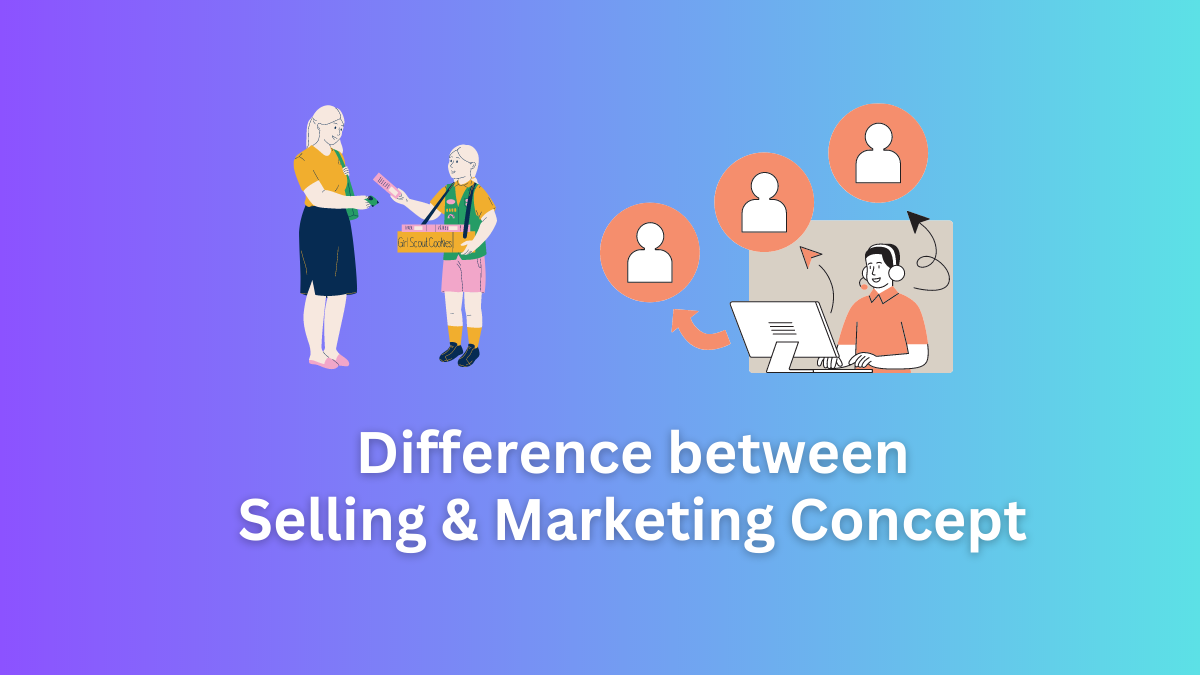Selling Vs. Marketing Concept
Selling and marketing concepts are two major marketing philosophies each with different means, ends, and focus. Both are important marketing philosophies and are often sometimes interchangeably used, however, they hold great differences from each other.
The selling concept lies in the idea of increasing sales through aggressive and heavy promotional methods. On the other hand, the marketing concept aims at increasing customer satisfaction.
In this article, we will explore the difference between selling and marketing concepts. So, let’s understand what the marketing and selling concept is, and the differences between them.
What is a Selling Concept?
The selling concept is a marketing philosophy that argues that businesses have a main goal is to sell a lot of products. It focuses on using persuasive tactics like advertising to make people buy things, even if they don’t really need them.
This concept believes that customers won’t buy enough on their own, so companies need to push them to buy. It’s a short-term approach that looks at increasing sales quickly. However, it may not consider what customers truly want and can lead to one-time purchases instead of building long-lasting relationships.
Related: Types of Consumer Needs
What is a Marketing Concept?
The marketing concept is a marketing philosophy whose center focus is to sell what customers want and increase customer satisfaction. It is a customer-oriented approach.
The marketing concept believes that customers do not like aggressive selling efforts. Instead, it says when goods and services are made in accordance with consumers’ needs and desires, they naturally come to buy products.
As such, at its core, the marketing concept says, to make products what your customers want, not what you want to sell.
Difference Between Selling and Marketing Concept
Now, Let’s differentiate between the selling and the marketing concept of marketing.
Focus
- Selling Concept: This approach concentrates on the needs of the seller. It revolves around convincing customers to purchase products, with a heavy emphasis on promotion and persuasion.
- Marketing Concept: Here, the focus shifts to the buyer’s needs. It’s about understanding what customers truly want and crafting products that cater to those needs.
Read Also: 8 Pros and 7 Cons of Marketing Concept
Perspective
- Selling Concept: It adopts an inside-out viewpoint, starting from the company’s products and trying to push them onto the market.
- Marketing Concept: Taking an outside-in approach, it begins by identifying the target market’s demands and then designing products that fit those demands.
Objective
- Selling Concept: The primary goal is to increase sales volume, often disregarding whether customers genuinely need the product.
- Marketing Concept: It aims for customer satisfaction as the ultimate objective, recognizing that this leads to long-term success and loyalty.
Starting Point
- Selling Concept: The starting point is usually the company’s production process or factory, from where products are pushed onto the market.
- Marketing Concept: It starts by pinpointing the target market – the group of people most likely to benefit from and desire the product.
Read Also: 8 Pros and 7 Cons of Selling Concept of Marketing
Business Planning
- Selling Concept: The approach involves short-term planning, often focusing on current products and markets.
- Marketing Concept: A long-term planning strategy is adopted, considering not only current products and markets but also forecasting new products and future growth.
Emphasis
- Selling Concept: It emphasizes the seller’s products and their features, rather than the customer’s needs.
- Marketing Concept: The main emphasis is on customer needs and wants, tailoring products to fulfill those desires.
Profit Source
- Selling Concept: Profit is generated through increased sales volume, even if customers might not necessarily benefit from the product.
- Marketing Concept: Profit is derived from customer retention, loyalty, and satisfaction, ensuring continued business success.
Competition Approach
- Selling Concept: Competing is centered around outdoing rivals in sales figures, often leading to aggressive promotional strategies.
- Marketing Concept: The competition revolves around satisfying customers better than competitors by meeting their specific needs.
Read Also: 8 Pros and 7 Cons of Product Concept of Marketing
Customer Perception
- Selling Concept: Customers are viewed as the last link in the business process, primarily seen as purchasers.
- Marketing Concept: Customers are perceived as the core purpose of the business, where the entire process aims to satisfy their needs.
Pricing Strategy
- Selling Concept: Price determination is often based on the cost of production, with little regard for market demand.
- Marketing Concept: Prices are influenced by market forces, demand, and supply, ensuring alignment with what customers are willing to pay.
Seller Oriented Vs. Customer Oriented
- Selling Concept: This approach is seller oriented. It says we make the products and sell them in the market.
- Marketing Concept: This approach is customer oriented. It says we understand the market, then make the products.
Example
- Selling Concept: Examples of selling concepts include insurance, luxury fashion brands, political campaigns, etc.
- Marketing Concept: Apple’s iPhone, Coca-Cola’s Personalized Bottles, Nike’s Personalized Shoes, etc. are examples of the marketing concept.
Read Next: Product Vs. Production Concept of Marketing: 11 Differences
Arti Kushmi holds a BBS (Bachelor in Business Studies) degree and shares her business and marketing knowledge through this website. While not writing she will be reading and enjoying the moment.
